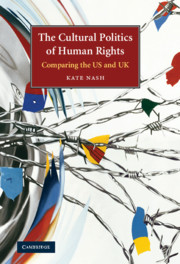Book contents
- Frontmatter
- Contents
- Preface
- List of acronyms used in the book
- Table of cases
- 1 What does it matter what human rights mean?
- 2 Analysing the intermestic human rights field
- 3 Sovereignty, pride and political life
- 4 Imagining a community without ‘enemies of all mankind’
- 5 Global solidarity: justice not charity
- 6 Conclusion
- References
- Index
5 - Global solidarity: justice not charity
Published online by Cambridge University Press: 27 June 2009
- Frontmatter
- Contents
- Preface
- List of acronyms used in the book
- Table of cases
- 1 What does it matter what human rights mean?
- 2 Analysing the intermestic human rights field
- 3 Sovereignty, pride and political life
- 4 Imagining a community without ‘enemies of all mankind’
- 5 Global solidarity: justice not charity
- 6 Conclusion
- References
- Index
Summary
The emphasis of struggles over intermestic human rights is on civil rights, and this has also been the emphasis of this study so far. It reflects an historic Western privileging of civil rights as absolutely fundamental, in comparison with social, economic and cultural rights which are often not conceived of as rights at all – even if they are enumerated in the UDHR – but rather as political aspirations towards at least minimal conditions of human well-being and flourishing. In this study, however, we are concerned with the social forms created by the cultural politics of intermestic human rights. Realising human rights in practice is always a collective endeavour; it is about the creation of new social forms. Human rights as civil rights require courts, education and training, intergovernmental agreements, international policing, communication networks and so on. They also require a cosmopolitan orientation towards justice, a reframing of issues of global justice as concerning citizens and non-citizens alike. In respect of the creation of cosmopolitan social forms, then, although social and economic rights are more explicitly about the collective management and distribution of resources, they are not fundamentally different in kind from civil rights.
Solidarity is a key term in social theory and as a result it has various different uses (see Crow 2002; Kurasawa 2007). For my purposes in this analysis, it is important to distinguish between ‘thinner’ and ‘thicker’ solidarity. ‘Solidarity’ invariably denotes a ‘we’ who feel ourselves to share common bonds.
- Type
- Chapter
- Information
- The Cultural Politics of Human RightsComparing the US and UK, pp. 137 - 165Publisher: Cambridge University PressPrint publication year: 2009



